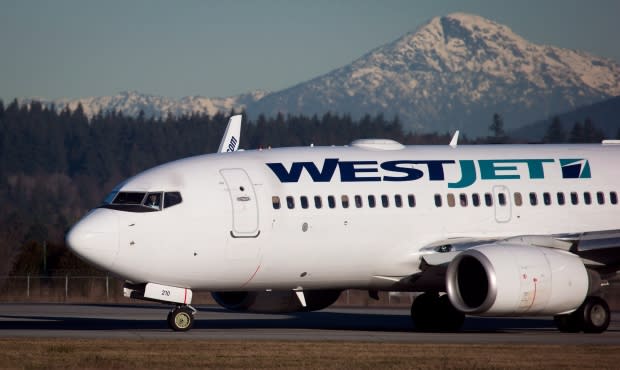Grandmother says airline left her stranded overnight after bird strike forced her to miss flight
A Halifax grandmother who missed a connecting flight home because her first plane was delayed by a bird strike says she was stranded in Toronto overnight without a credit card and without any compensation for a hotel or transportation from the airline.
Norma Greene, who is diabetic and doesn't carry a credit card, says her flight home after visiting her son in Calgary left her feeling stranded and helpless.
Greene says she was left to fend for herself overnight with no compensation from WestJet after the plane flying from Calgary to Toronto collided with a bird shortly after takeoff.
The incident led to a 3½-hour delay in Calgary. She said she was assured by a WestJet agent that someone in Toronto would meet her to give her a new itinerary and arrangements.
But that didn't happen, and it was too late to board the Halifax flight.
Greene says she wasn't too worried at first because a handful of passengers getting off an Edmonton plane had also missed the Halifax connection, and she noticed WestJet staff giving them vouchers for taxis and hotels for the evening.

"I just kind of took a deep breath and I was shaking and I was sweating. And when I got to the desk, I told the guy I was diabetic and if they could do something to get me situated quickly. And he said, 'I'm very sorry, there is nothing we can do for you,'" she said.
Greene was told the Edmonton passengers were delayed because of airplane maintenance, whereas her delay was due to an act of nature, so therefore she was not entitled to vouchers.
Gabor Lukacs, founder of the advocacy group Air Passenger Rights, says the airline is operating within the rules — both as they now exist and under a new set of regulations about to take effect.
Regulations take effect July 15
The Canadian Transportation Agency's new air passenger protection regulations are set to start coming into force this summer. The regulations will be launched in two phases, with some taking effect on July 15, and others not until Dec. 15
Broadly, flight disruptions — tarmac delays, flight cancellations and denials of boarding — that are within an airline's control require compensation be paid, standards of treatment be upheld and the passenger's itinerary be completed.
Flight disruptions within an airline's control but needed for safety reasons will not require compensation but airlines will have to maintain a standard of treatment and complete a passenger's itinerary.
Situations outside an airline's control that cause a flight disruption will only require the airline to ensure the passenger's itinerary is completed.
"The bird strike is something entirely, entirely out of their control and, unfortunately, unlike in Europe, where you would be entitled to accommodations and meals, in Canada, something like a bird strike or a snowstorm, for example, you are, unfortunately, not entitled to the kind of compensation we are discussing," Lukacs said.
Canada lagging behind Europe
He said even with the new regulations coming in to effect, Canada's rules are lax compared with Europe.
"Europe is the gold standard in passenger rights," he said.
"If this incident had happened in Europe, under the European regulations, she would be entitled not only to financial compensation but to accommodation, ground transportation and meals, because in Europe, even if there is a volcanic eruption, the airline has to at least provide accommodations and meals."
Greene's son booked her a Toronto hotel room on his credit card and had a meal delivered to her via Skip the Dishes.
WestJet says the airline's guest support team is still looking into Greene's experience.

